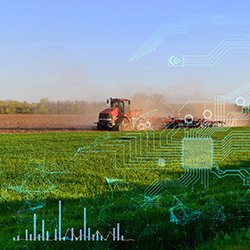Assessing Blockchain for AgriTech | IEEE Computer Society
[ad_1]
 Moving forward, the objective of blockchain is to enhance openness and accountability, which is why it is seen as a crucial component of contemporary agriculture. According to Statista, the worldwide market value of blockchain in the food and agricultural industry was around 140 million dollars in 2020 and is anticipated to reach approximately 1.5 billion dollars by 2026.
Moving forward, the objective of blockchain is to enhance openness and accountability, which is why it is seen as a crucial component of contemporary agriculture. According to Statista, the worldwide market value of blockchain in the food and agricultural industry was around 140 million dollars in 2020 and is anticipated to reach approximately 1.5 billion dollars by 2026.
Smart Farming – the Next Phase of AgriTech
In farming and agriculture, blockchain is applied as a system that helps to enhance the amount of trustworthy information on inventory, agricultural contracts, and the overall condition of farms. In the past, collecting this sort of information was an expensive endeavor, but soon, the blockchain might help to alter that.
Based on the value and promise of blockchain technology in agriculture, several smart farming models have been established that combine the characteristics of blockchain technology and IoT. For greenhouses that need IoT sensors to function as a private local blockchain that can be easily administered centrally by the farmer, a model of this kind has been devised. In addition to IoT technology and blockchain, a second general-use model has been presented.
This framework’s core premise fosters trust among the blockchain’s numerous players. Hence, multiple stakeholders may use smartphones to access the data collected at every stage of the agricultural process, including the sale of the goods.
Want More Tech News? Subscribe to ComputingEdge Newsletter Today!
Alleviating the Supply Chain Hurdles
The agriculture industry’s supply chain is notoriously opaque and complicated, with products passing through several hands before reaching their ultimate destination. As a result of globalization, the food supply chain in agriculture has grown longer and more intensive than ever before.
Existing challenges in the present food supply chain include those relating to food safety, quality, traceability, trust, and inefficiencies in the supply chain. This is detrimental not only to the economy and society, but also to consumers’ health. It is difficult for farmers to determine where, how much, and at what price their crops are finally sold. This lack of knowledge puts them in a vulnerable position, at the whim of traders who may dictate order prices and volumes.
By recording transactions in real-time and giving participants up-to-date information on supply and demand, blockchain technology may help correct this imbalance. Farmers with access to such information may be able to correctly establish their own pricing and maximize the number of goods they place on the market.
Moreover, by maintaining a continuous record of participants’ transaction histories, blockchain may make it much simpler for parties throughout the globe to do due diligence on one another and safely finalize deals without intermediaries or agents.
Furthermore, today’s customers need to know what they are eating, despite the fact that food travels from the farm to the table through several intermediaries. With blockchain technologies, the consumers will be able to make educated selections. They may even be able to help the improvement of small-scale farmers, who often lack food and financial stability due to blockchain’s data collection.
Bottom Line
Through facilitating the establishment of trust between farmers and customers, blockchain technology facilitates the resolution of a significant number of problems in the agricultural industry.
References
About the Author
 Business Technology Leader with 15 plus years of experience in Digital Transformation, Designing Enterprise Business applications to support Commercial and Corporate operations through driving process optimization and system enhancements that fully leverage the power of ERP applications and enable them with improved reporting capabilities.
Business Technology Leader with 15 plus years of experience in Digital Transformation, Designing Enterprise Business applications to support Commercial and Corporate operations through driving process optimization and system enhancements that fully leverage the power of ERP applications and enable them with improved reporting capabilities.
Sreekanth’s passion is to explore and leverage FinTech and Digital Technologies – Artificial Intelligence, Blockchain, Data Analytics, IoT, etc. in Agriculture to build robust and large-scale Agri-Technology products to de-risking agriculture for Farmers. He currently lives in the United States for the last 10+ years and works for a large FinTech/Payments company in the World, and is an IEEE Senior Member.
[ad_2]
Source link
